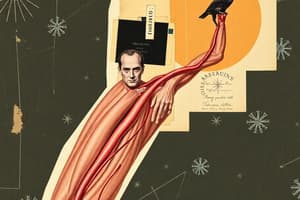Podcast
Questions and Answers
What is the main component of the motor end plate?
What is the main component of the motor end plate?
The motor nerve
What is the function of the synaptic cleft in neuromuscular transmission?
What is the function of the synaptic cleft in neuromuscular transmission?
- Hydrolyze acetylcholine
- Increase the surface area for Ach effect (correct)
- Contain mitochondria
- Release acetylcholine
Each motor unit follows the all or none law in neuromuscular innervation.
Each motor unit follows the all or none law in neuromuscular innervation.
True (A)
Flashcards are hidden until you start studying
Study Notes
Motor End Plate (MEP) Structure
- Consists of a motor nerve, synaptic cleft, and muscle fiber
- Motor Nerve:
- Loses its myelin sheath and branches into multiple sole foots to increase surface area
- Sole foots contain mitochondria, acetylcholine vesicles, and dense bars
- Covered by neurolemma, which continues with the sarcolemma of muscle fibers
Synaptic Cleft:
- Distance of 200-300 Å between the nerve and muscle fiber
- Releases acetylcholine (Ach) from the nerve to stimulate the muscle
- Contains cholinesterase enzyme, which hydrolyzes Ach
Muscle Fiber:
- Membrane has invaginations called synaptic gutters and subneural clefts to increase surface area for Ach effect
Neuromuscular Innervation:
Motor Unit:
- Consists of one anterior horn cell (AHC), its axon, and muscle fibers (3-300) supplied by this axon
- Obeys the all-or-none law
Motor Pool:
- Comprises all AHCs, nerve, and skeletal muscle supplied by it
Studying That Suits You
Use AI to generate personalized quizzes and flashcards to suit your learning preferences.




